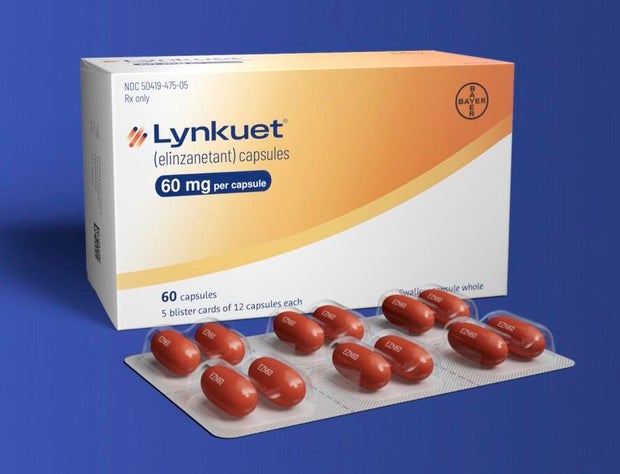The U.S. Food and Drug Administration has approved Lynkuet, a new daily pill from Bayer that provides a non-hormonal option for treating hot flashes. The drug, known generically as elinzanetant, is the second medication to directly target the brain pathways involved in body temperature control.
Menopause occurs when the ovaries stop producing estrogen, usually in a woman's late 40s or early 50s. Treating its symptoms has long been difficult because the transition affects multiple systems—temperature regulation, sleep, mood, bones, and sexuality—and the hormonal shifts vary widely among individuals. No single therapy can address all symptoms, and many overlap with other conditions, making menopause challenging to manage.
Hormone therapy is the most effective treatment for hot flashes and night sweats, but it is not suitable for everyone, especially women with a history of breast cancer. Despite how common menopause is, research funding to study menopause has historically been limited.
Lynkuet (pronounced LIN-kew-et) gained FDA approval on Friday after three randomized clinical trials. Data from the trials showed the pill, taken once daily, significantly reduced the frequency and severity of hot flashes and improved sleep.
Here's what to know:
How the drug works
Falling estrogen levels can confuse the brain's internal thermostat, causing sudden heat waves, sweating, and disturbed sleep in menopausal women.
Lynkuet works by blocking neurokinin-3 receptors, which help regulate body temperature and sleep. By calming that signaling pathway, the medication reduces the frequency and intensity of hot flashes and related nighttime symptoms.
Results from clinical trials
Three large studies with more than 2,000 women who had moderate to severe hot flashes found that those who took Lynkuet once a day had about 55% fewer hot flashes after 12 weeks compared with women taking a placebo. Many women began to feel better in just two weeks, according to results published in JAMA and JAMA Internal Medicine.
Lynkuet also made the hot flashes less intense and helped women sleep better and feel more rested.
 The pill, called Lynkuet (generic name elinzanetant) from drugmaker Bayer, is said to help treat hot flashes for menopausal women.
Courtesy of Bayer
The pill, called Lynkuet (generic name elinzanetant) from drugmaker Bayer, is said to help treat hot flashes for menopausal women.
Courtesy of Bayer
Use in women with breast cancer
Another trial published in The New England Journal of Medicine looked at how Lynkuet works for women with hormone receptor-positive breast cancer who were having hot flashes caused by their hormone-blocking treatment. After four weeks, women taking Lynkuet had significantly fewer hot flashes per day than those taking a placebo. They also said they slept better and felt better overall.
This is important because women being treated for breast cancer usually can't take hormone therapy to manage menopause symptoms, since their cancer medicines already lower or block estrogen. The study suggests that Lynkuet could be a safe, nonhormonal option for these women, though scientists are still studying how well it works and how safe it is over time.
Safety profile and side effects
The most common side effects are mild tiredness, headache, and sleepiness, Bayer said. Some trial participants developed elevated liver enzyme levels, a possible early sign of liver toxicity. For that reason, the FDA recommends blood tests before starting the drug and again after three months.
No serious liver injuries were reported in studies lasting up to one year, but post-approval monitoring will continue. Women who are pregnant or may become pregnant should avoid the medication, since animal studies suggest it could cause pregnancy loss.
Why the approval matters
Hot flashes affect an estimated 80% of women during menopause. For many, they last for years and interfere with sleep, concentration, and daily life. Non-hormonal options, like certain antidepressants and gabapentin, can help some women but are often less effective.
Lynkuet offers a different approach by targeting the biological mechanism that drives hot flashes. Its approval broadens treatment choices for menopausal symptoms, particularly for women who cannot or prefer not to use hormones.
Availability and cost
Lynkuet will be available in U.S. pharmacies starting in November 2025 with a prescription. Bayer said the list price will be about $625 per month, though insured patients could pay as little as $25 a month through savings programs.
Menopause is a universal experience, yet treatment options remain limited. The approval of Lynkuet adds a new choice for managing hot flashes and night sweats without hormones. While ongoing studies will determine its long-term safety and effectiveness, the drug represents a meaningful advance in care for women navigating this stage of life.
Edited by Lucia I Suarez Sang
FDA approves drug for menopausal hot flashes
FDA approves new drug to treat hot flashes in menopausal women
(02:07)


















































